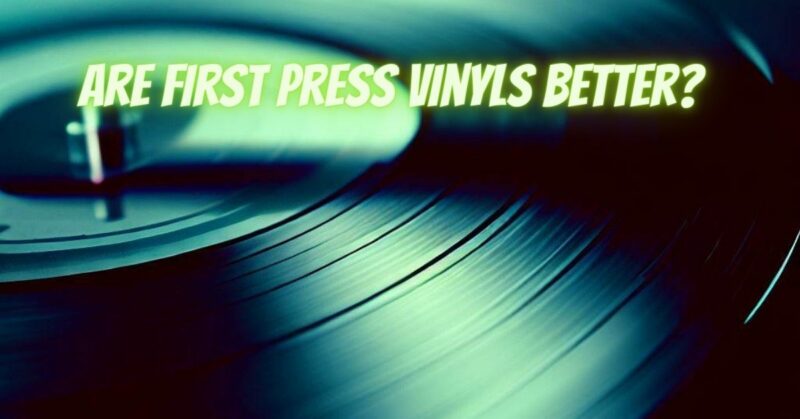Vinyl records have experienced a resurgence in popularity, with music enthusiasts and audiophiles rediscovering the joy of analog sound. Collecting vinyl records has become a passion for many, and the topic of “first press” vinyl records often arises in discussions among collectors. In this article, we explore the concept of “first press” vinyl records and discuss whether they are truly better than subsequent pressings, examining the factors that can affect the sound quality and value of vinyl records.
What is a First Press Vinyl?
A “first press” vinyl refers to the initial run of records produced from the original master recordings. When a new album is released, the record label manufactures the vinyl copies in batches, and the first batch is known as the first press. These initial pressings are usually identified by specific characteristics, such as serial numbers, matrix numbers, and markings on the vinyl and sleeve.
Factors Affecting Sound Quality
The sound quality of a vinyl record is influenced by various factors, including the mastering process, pressing quality, and vinyl material. While first pressings may have certain historical significance, it doesn’t necessarily mean they automatically sound better than subsequent pressings. Several factors can affect the sound quality, regardless of whether it’s a first press or later pressing:
- Mastering: The mastering process plays a crucial role in determining the sound quality of a vinyl record. A well-mastered record, whether a first press or later pressing, will generally sound better than a poorly mastered one.
- Vinyl Material: The quality and type of vinyl used can impact the sound. High-quality vinyl with fewer impurities tends to offer better sound reproduction.
- Pressing Quality: The pressing plant and equipment used can influence the final sound. Well-maintained presses and careful quality control during pressing contribute to better sound quality.
- Storage and Handling: The condition of the record and how it has been stored and handled over the years can affect its sound quality. Proper care, including keeping the vinyl clean and stored in appropriate conditions, is essential for maintaining good sound.
Collectibility and Value
While first press vinyl records may hold historical significance and appeal to collectors, they are not necessarily superior in sound quality to later pressings. The value and collectibility of a vinyl record are determined by various factors, including rarity, condition, and demand among collectors.
Certain limited edition or unique first pressings may have higher collectible value due to their scarcity, especially if they include special features like unique cover art, colored vinyl, or inserts. However, collectors also seek later pressings that are known for superior sound quality or include bonus tracks or additional content not available in the initial pressings.
In summary, while first press vinyl records can be of historical interest and hold value among collectors, they are not inherently better in sound quality compared to later pressings. The sound quality of a vinyl record is influenced by several factors, including the mastering process, vinyl material, and pressing quality, which can be consistent across various pressings.
When collecting vinyl records, it’s essential to consider the overall condition, pressing quality, and mastering of the specific record rather than solely focusing on whether it’s a first press or subsequent pressing. Collectors and music enthusiasts alike should prioritize the enjoyment of the music and the overall listening experience, appreciating the unique analog sound that vinyl records offer, regardless of the pressing’s historical significance.


